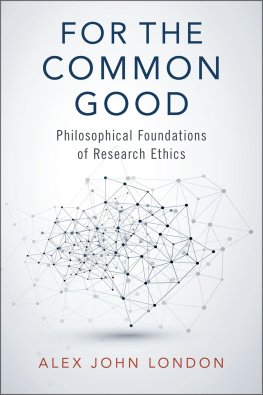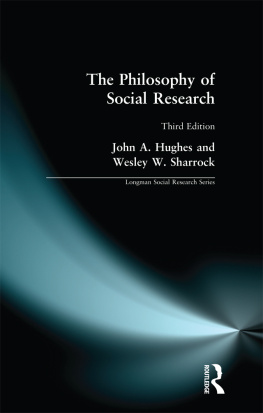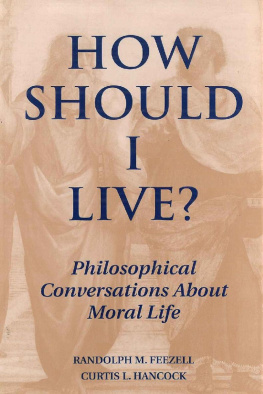For the Common Good

Oxford University Press is a department of the University of Oxford. It furthers the Universitys objective of excellence in research, scholarship, and education by publishing worldwide. Oxford is a registered trade mark of Oxford University Press in the UK and certain other countries.
Published in the United States of America by Oxford University Press
198 Madison Avenue, New York, NY 10016, United States of America.
Oxford University Press 2022
All rights reserved. No part of this publication may be reproduced, stored in a retrieval system, or transmitted, in any form or by any means, without the prior permission in writing of Oxford University Press, or as expressly permitted by law, by license, or under terms agreed with the appropriate reproduction rights organization. Inquiries concerning reproduction outside the scope of the above should be sent to the Rights Department, Oxford University Press, at the address above.
You must not circulate this work in any other form and you must impose this same condition on any acquirer.
CIP data is on file at the Library of Congress
ISBN 9780197534830
eISBN 9780197534854
DOI: 10.1093/oso/9780197534830.001.0001
To my children, Joshua, Sophia, and Alexandra.
Contents
As I was finishing the manuscript for this book in 2020 the SARS-CoV-2 pandemic was just beginning. As I write this preface, over 115 million people worldwide and nearly 30 million Americans have been infected with COVID-19. Although the United States accounts for less than 5% of the worlds population, Americans make up one-fifth of the 2.5 million deaths from COVID-19. As a philosopher who has worked on a range of ethical issues regarding research and public health emergency response, I was concerned that the United States was unprepared for a major disease outbreak. As the pandemic has unfolded it has been a cascade of fears come true.
One of the central messages of this book is that when there is conflict or uncertainty about how best to protect or promote individual or public health, there is a moral imperative to expeditiously carry out research that will provide the evidence and information necessary to ensure that therapeutic intent translates into clinical and public health benefit. Ignoring this responsibility in the face of conflicting judgment and scientific uncertainty and acting quickly from beneficent intent can lead to self-defeating practices. This includes expending scarce time, effort, and resources on, and configuring health systems to deliver, interventions that are ineffective or positively harmful. When large-scale efforts and confident public pronouncements from partisan political figures are subsequently shown to have been based on thin or faulty evidence and to have fallen short of their intended purpose, public trust erodes at the very time when trust and cooperation are both in the short supply and essential to effective pandemic response.
In contrast, the Randomised Evaluation of Covid-19 Therapy (RECOVERY) trial in the United Kingdom represents a paradigmatic example of the way that well-designed research can be used to structure pandemic response and to generate the evidence needed to quickly eliminate unsafe or ineffective strategies and concentrate efforts on those with substantive clinical value. Moreover, that study illustrates how the knowledge generated from scientifically sound and ethically responsible research constitutes a public good. Healthcare institutions around the globe have altered their practices in light of the evidence produced in that study, enabling them to be more effective at advancing patient interests and more efficient in their use of scarce resources.
In a very real sense, the current pandemic illustrates the way that scientifically sound and ethically responsible research constitutes a key tool for responding to uncertainty and generating the causal knowledge that a wide range of actors require in order to discharge key social responsibilities. One of the core claims of this book is that research of this kind is not a morally optional undertaking. The claim that community members have to a social order that protects and advances their ability to pursue a reasonable life plan grounds an imperative to carry out the research needed to effectuate these goals in practice.
In the United States, our reluctance to embrace this idea is rooted in a complex mixture of historical precedent and philosophical argument. We are haunted by the prospect that any imperative to carry out research to advance the common good will inevitably also justify abrogating the rights and welfare of study participants. This specter takes many forms and appears in many different arguments in research ethics. One goal of this book is to show that scientifically sound research and respect for the rights and welfare of individuals are not mutually exclusive. More strongly, the same concern for the common good that grounds an imperative to conduct scientifically sound research in the face of uncertainty and conflicting judgment grounds an equally strong imperative to ensure that this undertaking is organized on terms that respect its various stakeholders claim to be treated as free and equal persons.
Defending this conception of the common good and the imperatives that it grounds involves understanding research as a social undertaking. This social undertaking is a division of labor between a much wider array of stakeholders than are typically discussed in research ethics. This division of labor often involves important social institutions and produces information that these institutions need in order to discharge their proper social function. As a result, both the ends that research seeks to advance and the means that stakeholders use to advance those ends are ineluctably connected to fundamental considerations of justice.
Although the core claims of this book are centrally relevant to practical problems we are facing in the current pandemic, it is primarily focused on the philosophical foundations of research ethics. The content of the book is drawn from papers I have published over more than two decades. My goal has been to reorganize those ideas into a single narrative that provides a unified and coherent approach to a set of fundamentally philosophical problems that lie at the foundation of an inherently practical undertaking.
My hope is that the book as a whole will be of interest to a wide audience even if significant portions of that audience may not be interested in the whole book. There are places in various chapters where the philosophical arguments are dense, and I have tried to elaborate complex material with care. Readers from research ethics may be surprised to see so much attention paid to abstract questions of justice and comparatively little attention paid to practical problems surrounding informed consent. But my hope is that the rationale for this change in emphasis will be clear, that philosophically minded readers will appreciate these connections and that more practically minded readers will be content to follow their broad outlines.
Similarly, research ethics in the United States is a practical undertaking that arose in a particular historical context profoundly shaped by revelations of scandal and abuse. In I have tried to situate the core problems addressed in the book within a larger historical and conceptual context, recognizing that I am not a historian and that my presentation of that material is necessarily selective. My hope is that this material will be informative for readers who need this background and not too tedious for specialists. Balancing the challenge of writing across disciplines, engaging fundamentally philosophical arguments, and demonstrating their relevance to a very practical undertaking has been a lesson in humility.











